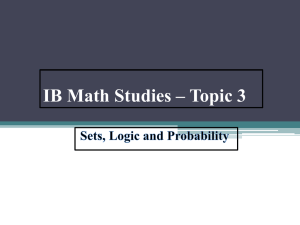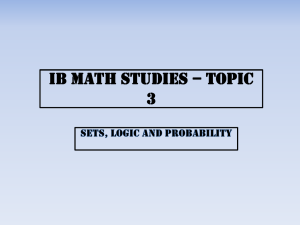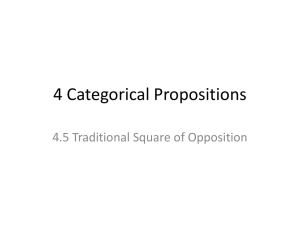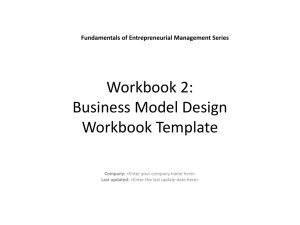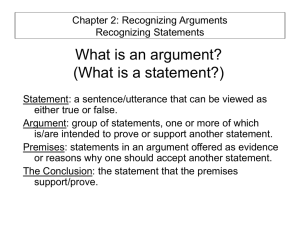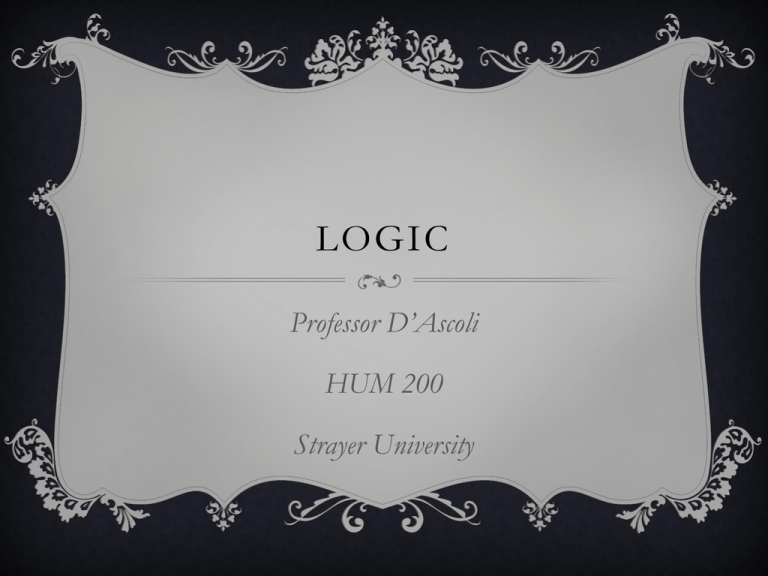
LOGIC
Professor D’Ascoli
HUM 200
Strayer University
WHAT IS LOGICAL?
LOGIC
WHAT IS LOGIC?
Lewis Carroll, Through the Looking
Glass: “Contrariwise, continued
Tweedledee, \if it was so, it might be;
and if it were so, it would be; but as it
isn’t, it ain’t. That’s logic."
THE TEXT BOOK TYPE
DEFINITION
Logic, from the Greek
λογικός (logikos) is the study of
reasoning. Logic is used in most
intellectual activity, but is studied
primarily in the disciplines of
philosophy, mathematics, and
computer science.
SOME DEFINITIONS OF
LOGIC
the branch of philosophy that analyzes inference
reasoned and reasonable judgment; i.e. "it made a certain kind of logic"
the principles that guide reasoning within a given field or situation; i.e.
"economic logic requires it"; "by the logic of war"
the system of operations performed by a computer that underlies the machine's
representation of logical operations
a system of reasoning
LOGIC IS MATHEMATICAL
LOGIC IS ARGUING IN A
REASONABLE WAY
LOGIC – OUR TEXT
Logic is the study of reasoning: how it is
done correctly, how it goes wrong, and how to
distinguish between the two.
Reasoning involves constructing and
evaluating arguments.
PROPOSITIONS
Arguments are made up of propositions.
In an argument, we attempt to establish the truth of a proposition on
the basis of others.
Propositions are assertions that are either true or false.
A simple proposition makes only one assertion.
Compound propositions contain two or more simple propositions.
Compound propositions can be either disjunctive or hypothetical.
PROPOSITIONS
There are many propositions about whose truth we are uncertain.
Examples:
There is life on other planets.
There is a God.
These may be true or false, therefore their ‘truth value’ is uncertain.
However, these, like all other propositions must be either true or false.
PROPOSITIONS
Questions are not propositions as they assert no truth values (Do you like this
class?)
Commands and exclamations are also not propositions as they also assert no
truth values (ie, Come here. Watch Out!, etc)
Sentences can take many forms to assert the same thing, even different
languages can assert the same thing
This class is stupid
Esta clase es estúpida
Cette classe est stupide
PROPOSITIONS
Propositions and statements are not exactly the same, but they are
often used in logic in the same sense.
Some logic texts even use the word statement rather than
proposition. We will use proposition
PROPOSITIONS
Some propositions (compound) contain more than one
proposition in the same sentence: China is the most populous
country in the world, it produces 85% of the world’s goods and has a
communist government.
The above is also an example of conjunctive propositions –
though listed together , they could all be listed separately and still be
true.
PROPOSITIONS
However, there could also be compound propositions that are
disjunctive , where no one of the components is asserted.
For example, “Circuit courts are useful, or they are not useful.”
Although this example is clearly a true but one of its components
might be false.
PROPOSITIONS
There are also hypothetical (or conditional) propositions – these are compound
propositions that also do not assert that their components are true but rather that
the whole is true.
Example : “If God did not exist, it would be necessary to invent him.”
Again neither claim is asserted, rather it becomes an if then hypothetical
dilemma which even if both parts are wrong, may still be a true proposition –
because it is hypothetical
You can never successfully argue hypotheticals
Excercises pages 9-12
IS THIS AN ARGUMENT?
http://www.youtube.com/watch?v=teMlv3ripSM
YouTube - Monty Python - Argument Clinic
LOGICAL FALLACY?
http://www.youtube.com/watch?v=yp_l5ntikaU
YouTube - monty python-witch scene
Professional Logician monologue - YouTube - Monty Python and the Holy Grail
Soundtrack 3/7: Logician http://www.youtube.com/watch?v=FZqs36C5sgM&feature=related
Good evening. The last scene was interesting from the point of view of a professional logician
because it contained a number of logical fallacies; that is, invalid propositional constructions and
syllogistic forms, of the type so often committed by my wife. "All wood burns," states Sir Bedevere.
"Therefore," he concludes, "all that burns is wood." This is, of course, pure bullshit. Universal
affirmatives can only be partially converted: all of Alma Cogan is dead, but only some of the class of
dead people are Alma Cogan. "Oh yes," one would think.
However, my wife does not understand this necessary limitation of the conversion of a
proposition; consequently, she does not understand me. For how can a woman expect to appreciate a
professor of logic, if the simplest cloth-eared syllogism causes her to flounder.
For example, given the premise, "all fish live underwater" and "all mackerel are fish", my wife will
conclude, not that "all mackerel live underwater", but that "if she buys kippers it will not rain", or that
"trout live in trees", or even that "I do not love her any more." This she calls "using her intuition". I
call it "crap", and it gets me very *irritated* because it is not logical.
"There will be no supper tonight," she will sometimes cry upon my return home. "Why not?" I will
ask. "Because I have been screwing the milkman all day," she will say, quite oblivious of the howling
error she has made. "But," I will wearily point out, "even given that the activities of screwing the
milkman and getting supper are mutually exclusive, now that the screwing is over, surely then, supper
may, logically, be got." "You don't love me any more," she will now often postulate. "If you did, you
would give me one now and again, so that I would not have to rely on that rancid Pakistani for my
orgasms." "I will give you one after you have got me my supper," I now usually scream, "but not before"
-- as you understand, making her bang contingent on the arrival of my supper.
"God, you turn me on when you're angry, you ancient brute!" she now mysteriously deduces, forcing
her sweetly throbbing tongue down my throat. "Fuck supper!" I now invariably conclude, throwing logic
somewhat joyously to the four winds, and so we thrash about on our milk-stained floor, transported by
animal passion, until we sink back, exhausted, onto the cartons of yoghurt.
I'm afraid I seem to have strayed somewhat from my original brief. But in a nutshell:
Sex is more fun than logic -- one cannot prove this, but it "is" in the same sense that Mount Everest
"is", or that Alma Cogan "isn't".
Goodnight.
IS THIS AN ARGUMENT?
1.
Ms. Malaprop left her house this morning.
2.
Whenever she does this, it rains.
_____________
3.
Therefore, the moon is made of blue cheese.
ARGUMENTS
Inference is the process that may tie together a cluster of
propositions, some are warranted (correct) others are not
An argument in logic does not refer to a disagreement
An argument refers strictly to any group of propositions of which
one of the propositions is claimed to follow from the other
propositions
For every possible inference there is a corresponding argument
ARGUMENTS
Although sentences express propositions, a sentence
and a proposition are not identical.
The propositions that provide evidence or support for
the truth of some other proposition are called premises.
The proposition for which evidence is provided is
called the conclusion.
ARGUMENTS
Sometimes premise and conclusion appear in separate sentences:
“No one was present when life first appeared on earth. Therefore any
statement about life’s origins should be considered as theory, not fact.”
Sometimes they appear in same sentence:
“Since it turns out that all humans are descended from a small number
of African ancestors in our recent evolutionary past, believing in
profound differences between the races is as ridiculous as believing in a
flat earth.”
ARGUMENTS
The order in which premises and conclusions can appear are also
varied. This does not matter in determining validity or soundness of
arguments.
ARGUMENTS
Arguments often contain conclusion and premise indicators that
allow one to identify them as arguments.
When indicators are lacking, the context of the passage provide
cues as to whether it is argumentative in nature. P 13 – 14 let’s discuss
Once an argument is identified, care must be taken to identify
premises which are not in a declarative form or premises that are
unstated. P 14 -15-16-17-18-19
CONCLUSION INDICATORS
Therefore
-
for these reasons
Hence
-
it follows that
So
-
I conclude that
Accordingly
-
which shows that
In consequence
-
which means that
Consequently
-
which entails that
Proves that
-
which implies that
As a result
-
which allows us to infer that
For this reason
-
which points to the conclusion that
Thus
-
we may infer
PREMISE INDICATORS
Since
-
as indicated by
Because
-
the reason is that
For
-
for the reason that
As
-
may be inferred from
Follows from
-
may be derived from
As shown by
-
may be deduced from
Inasmuch as
-
in view of the fact that
ARGUMENTS
Arguments must be distinguished from other forms of expression
involving sets of propositions, for instance, expository passages and
explanations.
An explanation is a group of statements that purport to account
for why something happened or why something is the way that it is. P
19-20-21 excercises pages 21-26
DEDUCTIVE ARGUMENTS
Some arguments are deductive, and some inductive—and all arguments are
either one or the other.
Deductive arguments claim that if the premises are true, the conclusion follows
with absolute necessity. That is, it cannot be false.
In valid deductive arguments, if the premises are true, the conclusion does,
indeed, follow with absolute necessity.
An invalid deductive argument is one in which, if the premises are true, the
conclusion could be false.
A sound deductive argument is one that is valid and has all true premises.
DEDUCTIVE ARGUMENTS
The relationship between true (or false) propositions and valid (or
invalid) arguments is sometimes quite complex.
The only combination of premises and conclusion whose truthvalues guarantee the invalidity of the argument is when the premises
are true and the conclusion false
INDUCTIVE ARGUMENTS
In inductive arguments, the conclusion is claimed to follow only
with high probability.
Inductive arguments are never valid or certain; they can be better
or worse, more or less probable, but they can never be valid or invalid.
P 28-30
IS THIS ARGUMENT VALID?
1.
If the moon is made of blue cheese, then pigs fly.
2.
The moon is made of blue cheese.
______________
3.
Therefore, pigs fly.
WHAT WE AIM FOR
An argument is
sound if and only if the argument is valid
and, in addition, all of its premises are true.
VALIDITY AND TRUTH
Valid (validity) – refers to the relation between its propositions
only, if the conclusion follows with logical necessity from the
premises then an argument is said to be valid
Validity can never refer to a single premise by itself
Truth – is the attribute of a proposition that asserts what really is
the case
Truth cannot apply to arguments
VALIDITY AND TRUTH
Truth and falsity are attributes of individual propositions or
statements; validity and invalidity are attributes of arguments.
P 31-33 discuss samples
Excercises page 35
KEY TERMS
Proposition Argument Premise
Statement Conclusion Probability
Validity Induction Necessity
Soundness Deduction Simple proposition
Compound proposition Disjunctive proposition Hypothetical proposition
Classical logic Modern symbolic logic Explanation
Explanation Inference Enthymemes
SOME QUESTIONS/
DISCUSSION
1. Why is logic relevant to everyday life? Why should one take a course in logic?
2. We often rely on appeals to emotion in order to persuade people rather than
providing arguments. Give some examples of this from everyday contexts. Is this
problematic? Are there cases when appeals to emotion are appropriate?
3. Give an example of a simple argument you have made recently. Which
statements are the premises? Which one is the conclusion?
4. What is the distinction between deductive and inductive arguments? Give an
example of each to make your explanation clear.
5. What is the difference between validity and soundness? Why is the distinction
relevant for us as students of logic?
HOMEWORK QUESTIONS
1. What is the difference between a premise and a conclusion?
Provide an example of an argument from a newspaper or journal that
highlights this distinction.
2. Why is reasoning considered to be both an art and a skill and
how does taking a course in logic help us to develop that skill?
3. What is the difference between inductive and deductive
arguments? What are the ramifications of this difference?
HOMEWORK CONTINUED
4. A valid argument does not necessarily mean that the premises and
the conclusion are true. In some cases, a deductive argument will be valid
even when its premises and conclusion are false. If validity doesn’t mean
truth, why should a logician be concerned with validity?
5. In everyday contexts, we are confronted with argument in a variety
of different spheres; political, religious, legal, medical, and so on. Why is it
important to be able to analyze and assess these arguments?



